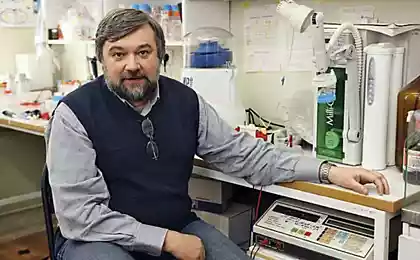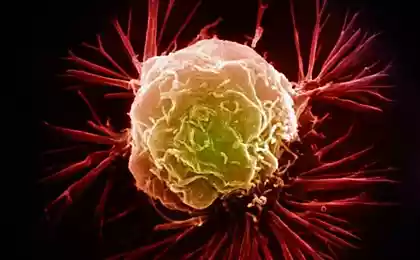374
Chili peppers and cancer: who?
Previous research has shown that capsaicin, which gives chili pepper hot taste, can be used in the composition of the external analgesics. The gels on the basis of this material can now be found in pharmacies worldwide. Recently, however, Ann boud at the University of Minnesota (USA) have proved that capsaicin is dangerous because it provokes the development of cancer.

Red hot pepper (Chile), or Mexican, paprika is one of the most widely used in Asian countries spices. There are some grades and the sizes of Chile, all of them differ aroma and sharpness degree.
Chili — differs from its congeners more scarlet color, a sweetish odor and studies have shown that when used in moderation pronounced therapeutic effect on the body.
Burning taste of peppers gives the alkaloid capsaicin, also contains fatty oil, carotenoids, capsorubin, capsanthin and carotene, sugar. According to doctors, a little red pepper just a storehouse of vitamins B2, B6, P, E and PP, and vitamin C it contains two times more than the lemon.
But still, eating chili peppers promotes the production of endorphins — "happiness hormones". The mechanism of operation is very simple: liberally pepper your food or bite a piece of the red "killer", you will feel an acute burning in the mouth, the brain perceives this as a threat and dumps into the blood endorphins, to reduce the shock and stress. And the "hormones of happiness", in turn, improve immunity, improve blood circulation, relax any pain and reduce stress.
A few years ago a group of researchers from the Tasmanian University found that chili helps people to cope with insomnia. And Kenji Okajima, Professor, University of medicine and pharmacology, Kumamoto, found that the compound capsaicin, a substance contained in chili peppers and gives them their heat, and isoflavone found in soybeans, help restore hair on head and eyebrows drop down at the man when he is experiencing stress.
Previously, scientists from Nottingham University (Nottingham University) found that capsaicin, which is responsible for the sharp taste and the irritating action of hot peppers, causes massive destruction of malignant cells through effects on mitochondria — organelles that provide cells with energy.
In the study, scientists led by Timothy Bates (Timothy Bates) studied the effect of capsaicin on cell culture lung cancer and pancreatic cancer. It turned out that capsaicin binds to proteins of the mitochondria of cancer cells, and stimulates the process of apoptosis (genetically programmed cell death) without affecting healthy cells.
"Since these substances attack the heart of the tumour cells, we believe that we were able to detect the main "Achilles ' heel" of any cancer. Biochemistry of mitochondria of cancer cells is very different from the biochemistry of normal cells. The election is inherent in cancer cells vulnerability", — said Bates.
Thus, the dose of capsaicin that stimulates the apoptosis of cancer cells, does not affect normal cells, he added. According to the authors of the study, in the future, on the basis of capsaicin and similar substances can be an effective protivogribkovye drugs.
Now, in the course of its recent research, American scientists have found that contained in the peppers capsaicin not only causes the destruction of cancer cells. At the same time he is able to act as a carcinogen, especially at the early stages of tumor development, writes The Times of India.
Ann boud at the University of Minnesota States: a significant result of our research work is identified the probability that capsaicin somehow stimulates the growth of cancer cells.
In this regard, the question arises of the safety of painkillers gels with capsaicin sold worldwide.published
Author: Liliana Lokatskaya
P. S. And remember, only by changing their consumption — together we change the world! ©
Source: www.medpulse.ru/health/yourshealth/9179.html

Red hot pepper (Chile), or Mexican, paprika is one of the most widely used in Asian countries spices. There are some grades and the sizes of Chile, all of them differ aroma and sharpness degree.
Chili — differs from its congeners more scarlet color, a sweetish odor and studies have shown that when used in moderation pronounced therapeutic effect on the body.
Burning taste of peppers gives the alkaloid capsaicin, also contains fatty oil, carotenoids, capsorubin, capsanthin and carotene, sugar. According to doctors, a little red pepper just a storehouse of vitamins B2, B6, P, E and PP, and vitamin C it contains two times more than the lemon.
But still, eating chili peppers promotes the production of endorphins — "happiness hormones". The mechanism of operation is very simple: liberally pepper your food or bite a piece of the red "killer", you will feel an acute burning in the mouth, the brain perceives this as a threat and dumps into the blood endorphins, to reduce the shock and stress. And the "hormones of happiness", in turn, improve immunity, improve blood circulation, relax any pain and reduce stress.
A few years ago a group of researchers from the Tasmanian University found that chili helps people to cope with insomnia. And Kenji Okajima, Professor, University of medicine and pharmacology, Kumamoto, found that the compound capsaicin, a substance contained in chili peppers and gives them their heat, and isoflavone found in soybeans, help restore hair on head and eyebrows drop down at the man when he is experiencing stress.
Previously, scientists from Nottingham University (Nottingham University) found that capsaicin, which is responsible for the sharp taste and the irritating action of hot peppers, causes massive destruction of malignant cells through effects on mitochondria — organelles that provide cells with energy.
In the study, scientists led by Timothy Bates (Timothy Bates) studied the effect of capsaicin on cell culture lung cancer and pancreatic cancer. It turned out that capsaicin binds to proteins of the mitochondria of cancer cells, and stimulates the process of apoptosis (genetically programmed cell death) without affecting healthy cells.
"Since these substances attack the heart of the tumour cells, we believe that we were able to detect the main "Achilles ' heel" of any cancer. Biochemistry of mitochondria of cancer cells is very different from the biochemistry of normal cells. The election is inherent in cancer cells vulnerability", — said Bates.
Thus, the dose of capsaicin that stimulates the apoptosis of cancer cells, does not affect normal cells, he added. According to the authors of the study, in the future, on the basis of capsaicin and similar substances can be an effective protivogribkovye drugs.
Now, in the course of its recent research, American scientists have found that contained in the peppers capsaicin not only causes the destruction of cancer cells. At the same time he is able to act as a carcinogen, especially at the early stages of tumor development, writes The Times of India.
Ann boud at the University of Minnesota States: a significant result of our research work is identified the probability that capsaicin somehow stimulates the growth of cancer cells.
In this regard, the question arises of the safety of painkillers gels with capsaicin sold worldwide.published
Author: Liliana Lokatskaya
P. S. And remember, only by changing their consumption — together we change the world! ©
Source: www.medpulse.ru/health/yourshealth/9179.html
Created a system that can turn a person's thoughts in text messages
The Dutch 10 days, independent of the network
























